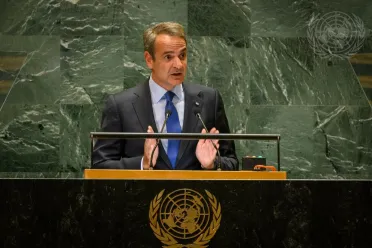Statement
Statement summary
KYRIAKOS MITSOTAKIS, Prime Minister of Greece, noting that his country is an incoming member of the Security Council, said its tenure will be guided by three words “of Greek origin but universal meaning: dialogue, diplomacy and democracy”. Its six priorities will be the peaceful settlement of disputes; respect for international law; women, peace and security; climate, peace and security; children in armed conflict; and “of course, as a seafaring nation, maritime security.” Stressing the importance of Council reform, he said “it is a relic of a world that no longer exists.” Nearly one third of UN Member States have never sat on the Council, he pointed out, calling for its enlargement in both permanent and non-permanent categories. Noting that Greece will do its utmost to be a stabilizing actor, he said “that work begins in our immediate neighbourhood.” His country is a gateway to Europe, North Africa and the Middle East, he said, noting that Greece sits less than 900 miles away from both Gaza and Ukraine.
Expressing concern about the ongoing violence in the Middle East, he called on all parties, including Iran, to back away from perpetuating the current destructive cycle. People on both sides of the southern Lebanon border have a right to live peacefully, he said, supporting the proposal for an immediate 21-day ceasefire. Greece will always support Israel's legitimate right to defend itself, “but how it does so matters”, he stressed, reaffirming support for a two-State solution. Since February 2022, the Russian Federation has brought violence, misery and destruction back to the European continent, he said, expressing solidarity with the Ukrainian people who are fighting for their freedom and independence. From the first hours of the Russian Federation's aggression, the European Union rose to the occasion, providing every possible support to Ukrainians. “The war in that country is not simply another local European conflict,” he said. It is a brutal challenge to the rules-based order that the UN stands for.
Turning to his country’s “at times, tense relationship with Türkiye”, he noted the signing of the Athens Declaration and reaffirmed willingness to work towards resolving the delimitation of the continental shelf and the Exclusive Economic Zone in the Aegean and the eastern Mediterranean. However, he also noted that this year marks the fiftieth anniversary of Türkiye’s illegal invasion and occupation of over a third of the territory of Cyprus, and reaffirmed commitment to that country’s sovereignty and territorial integrity. A two-State solution cannot and will not be acceptable, he said, calling upon Türkiye and the Turkish Cypriot community to come to the negotiating table. Turning to the western Balkans, he said the countries of the region must leave behind the traumatic legacy of the past and embrace their European future. Calling on them to improve democratic governance, pursue difficult internal reforms and commit to good neighbourly relations, he cautioned that “there are disrupters who would like nothing more than to cause new divisions in this sensitive corner of Europe.”
“Like steam or electricity before it,” he said, artificial intelligence presents a huge opportunity to transform human life and drive solutions across science, climate change and medicine. However, unchecked and in the hands of malign actors, it could become a weapon of control in an uncertain world order. Noting that technology companies are transnational actors with more economic muscle than most countries at the United Nations, he pointed out that there is no framework to govern their actions or ensure accountability. Highlighting the adverse effects of digital technology and algorithms on the mental health of children, he noted that “the brains of our children are being rewired at an almost unimaginable scale, yet we do nothing.” Technology companies must come to the table and take tangible action to prioritize safety over profits. If they don't, pragmatic solutions such as banning devices in schools — which his country implemented this year — should be complemented by harsher regulatory responses, he underscored.
Full statement
Read the full statement, in PDF format.
Photo

Previous sessions
Access the statements from previous sessions.
